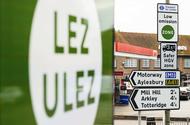Prior believes there’s truth on both sides of ULEZ, but consensus on nothing
Amid the arguments for and against ULEZ, there’s a solution we should pay closer attention to
Not even scientific studies can reach consensus about how effective central London’s Ultra Low Emission Zone (ULEZ) has been, so it’s no surprise that the expanded version – the world’s largest such zone, which came into operation last week – doesn’t exactly have unanimous backing.
The arguments against – with which I have varying degrees of sympathy – are numerous.
It will make precious little overall difference, given that London’s air quality is improving anyway and more polluting cars will naturally reach the end of their lives soon enough; that nobody especially wants to drive around London but many have few alternatives; that it will disproportionately affect those who can afford it the least, especially shift workers; that if the authorities were really serious about improving air quality, they would ban domestic fireplaces and wood burners, only that can’t be used as a revenue-earner for cash-strapped Transport for London; that as it applies to those who visit Heathrow airport, it’s a tax on holidaymakers to the potential tune of tens of thousands of pounds a day; that applying it to motorcycles is particularly pointless; that if the authorities didn’t want us to drive diesels, they shouldn’t have spent 20 years telling us to; and that ultimately it feels like a cynical attack on personal freedoms.
To that last one, the counter-argument – and it’s also a compelling one – is ‘so you want the freedom to gas babies, do you?’.
There’s truth on both sides, consensus on nothing. Although the ULEZ does seem to be a vote-loser on the London margins, and I note that the protesters vandalising and removing infrastructure (almost 500 cameras, according to the BBC) don’t seem as unpopular as some other recent dissenters. But it’s here.
Anyway, onto something good that could come from it. London has introduced a scrappage scheme to help some residents of the new ULEZ make the move to cleaner vehicles, and a charity helping cars get to Ukraine has proposed that 4x4s traded into the scheme could, instead of being crushed, be shipped to the besieged nation, which is keen on having any working diesel 4x4s.
Unfortunately, well, the number of times ‘unfortunately’ was said in a response from London’s City Hall to this request will be familiar to anyone who has tried to get officials to go beyond their normal box-ticking remit.
“There are unfortunately some barriers that would stop this being possible”, “unfortunately, it is not a simple or quick process to change [processes]” and “unfortunately, the main request of acquiring vehicles due to be scrapped is not going to be possible”.
It’s properly depressing ‘computer says no’ stuff – as Car for Ukraine charity organiser Richard Lofthouse says, “a classic brush-off”.
He told Autocar: “Lovers and haters [of the ULEZ] can find common cause at least in saying: ‘It’s horrible to scrap a perfectly good car. Why on earth can’t we send some to Ukraine?’ Anyone can see that this isn’t hard to do as long as the owner agrees.”
Quite so. Are you telling me it’s possible to implement the world’s largest low-emission zone, controlled by numberplate-recognising cameras, with signage and fines and the back end to run it, yet not to manually make some inputs to a spreadsheet that would let a handful of working 4x4s be donated to a country that desperately needs them?
Are we really going to crush valuable cars while charities scrabble to raise money to buy them? It can’t be impossible to implement one but not the other.






